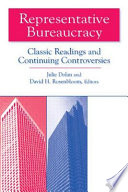
Representative Bureaucracy: classic readings and continuing controversies
By - Dolan, Julie; , Rosenbloom, David H.
Floor
-
Floor 1
Published
-
M.E. Sharpe, Armonk, N.Y., 2003
ISBN 10 - 0765609614
ISBN 13 - 9780765609618
Book Status
-
1 Qnty Available with us.
Subject
-
Bureaucracy Bureaucracy United States
Shelf No
-
13
Call Number
-
352.6309 REP
Physical Description
-
xiii, 218 pages ; 24 cm
Notes
-
includes index